June 21, 2025 | 01:29 GMT +7
June 21, 2025 | 01:29 GMT +7
Hotline: 0913.378.918
June 21, 2025 | 01:29 GMT +7
Hotline: 0913.378.918
Yen Bai Provincial People's Committee, in collaboration with the Management Board of Hai Phong Economic Zone, organized a conference on October 27 to promote and facilitate investment connections with South Korean businesses. Several cooperative agreements between Yen Bai province and South Korean businesseswere signed during the event, paving the way for opportunities to expedite and sustain the rapid development of Yen Bai province in the near future.
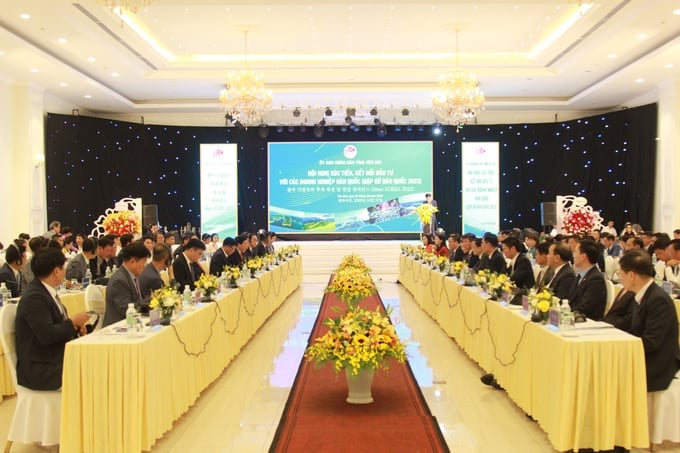
The conference to promote investment and connection in Yen Bai province saw the participation of over 50 South Korean businesses. Photo: Thanh Tien.
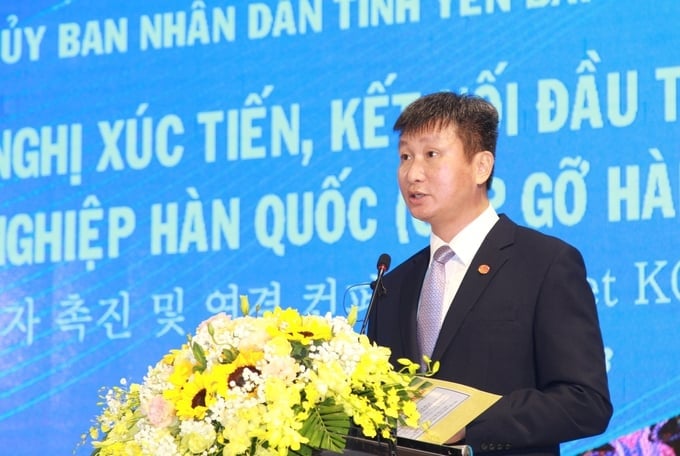
Mr. Tran Huy Tuan, Chairman of the Yen Bai Provincial People's Committee aims to enhance economic cooperation and promote investment with South Korean partners. Photo: Thanh Tien.
Mr. Tran Huy Tuan, Chairman of the Yen Bai Provincial People's Committee affirmed that the province has established itself as a pivotal area along the economic corridor of Con Minh - Lao Cai - Hanoi - Hai Phong - Quang Ninh. Additionally, Yen Bai province offers numerous advantages in trade connections with significant economic centers, border gates, seaports, and international airports such as Hanoi, Hai Phong port, Noi Bai airport, and international border gates with China.
Moreover, Yen Bai province boasts rich natural resources including minerals, forests, tourism, comprehensive infrastructure, abundant high-quality human resources, an active local government, business development support services, streamlined administrative procedures, accessibility to land, transparent disclosure of information regarding planning and investment attraction policies, and low investment costs.
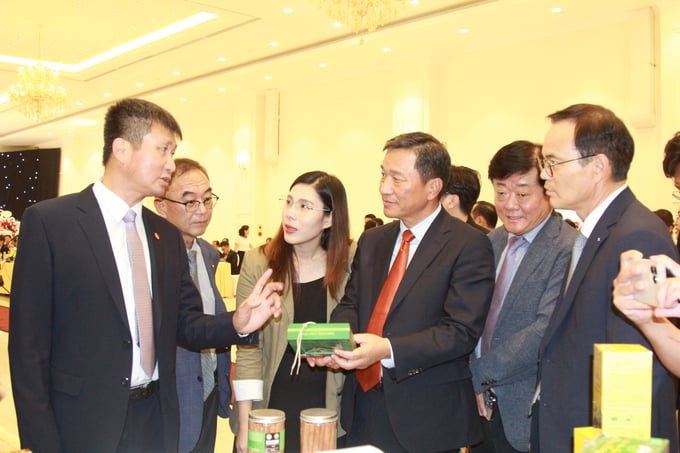
Chairman of the Yen Bai Provincial People's Committee engaged in discussions with South Korean partners regarding the potential and strengths of the province. Photo: Thanh Tien.
Yen Bai province aspires for the continued close collaboration and support from major South Korean businesses to develop key high-tech industries such as information technology, electronics, digital transformation, energy transition, clean energy, renewable energy, climate change adaptation, metallurgy, mechanics, and mining. Additionally, both parties aim to establish multiple supply chains and enhance cooperation in culture and sports to further elevate their reputation, thereby fostering the positive values of each country within the region as well as the international stage.
According to Mr. Cha Sung Wook, Deputy General Director of the Korean Trade-Investment Promotion Agency (KOTRA) in Hanoi, the total foreign investment capital in Yen Bai province amounts to 480 million USD across 38 projects, with South Korean investment in Yen Bai totaling 248 USD million through five major projects. Consequently, South Korea is currently leading in terms of investment capital among the countries investing in Yen Bai.
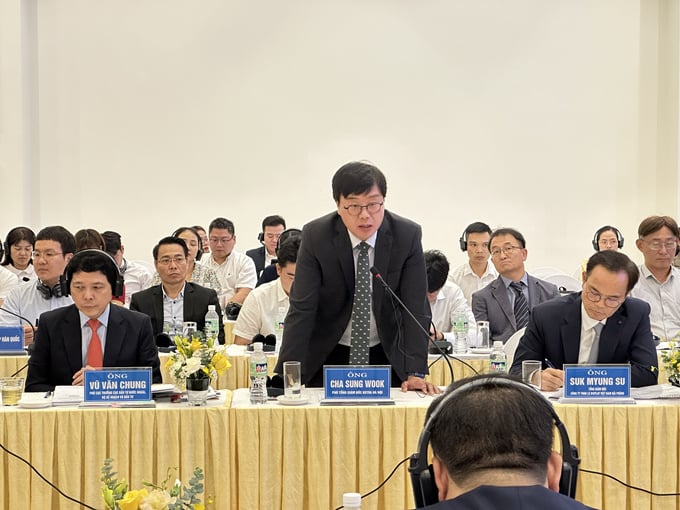
Mr. Cha Sung Wook, Deputy General Director of the Korean Trade-Investment Promotion Agency in Hanoi, delivering a speech at the conference. Photo: Thanh Tien.
South Korean businesses plan to further invest in promising sectors such as processing industries, manufacturing new materials, new energy, clean energy, production support industries, electronic component manufacturing, high-tech industrial applications, environmentally friendly industries, and traditional handicrafts. Regarding agriculture, focus will be shifted towards highly potential sectors such as sustainable forestry development, tourism, healthcare, vocational education, finance and banking, logistics, agriculture, and industrial support services.
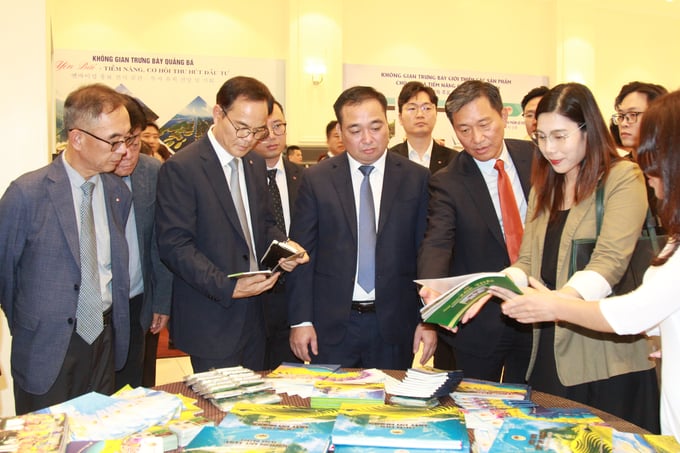
South Korean businesses visiting the exhibition showcasing informational materials regarding Yen Bai province. Photo: Thanh Tien.
South Korean businesses wishes for Yen Bai province to continue promoting its image, potential, and advantages through various public communication channels. This dissemination aims to attract foreign investments and connect with South Korean businesses as well as the international stage.
During the conference, Mr. Tran Huy Tuan and Mr. Mun Hyun, Chairman of the Korea Happiness Foundation, signed a cooperation agreement in the fields of culture, arts, economic exchange, tourism, healthcare, etc. Additionally, representatives from the Yen Bai Center for Business Support, Consultation, and Investment Promotion and the Employment Services - Training - Investment Promotion Center under the Management Board of Hai Phong Economic Zone signed an agreement to strengthen cooperation in investment promotion and business support activities.
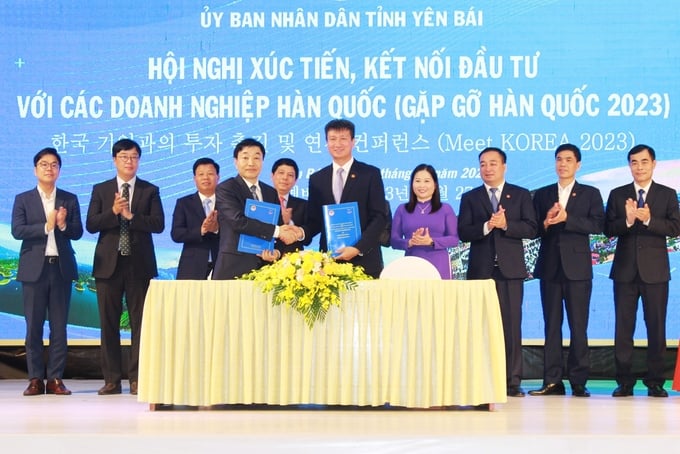
The Chairman of the Yen Bai Provincial People's Committee and Mr. Mun Hyun, Chairman of the Korea Happiness Foundation, signing a cooperation agreement in the fields of culture, arts, economic exchange, tourism, and healthcare. Photo: Thanh Tien.
Yen Bai province's Center for Industry and Trade Promotion signed an agreement with the Employment Services - Training - Investment Promotion Center under the Management Board of Hai Phong Economic Zone to collaborate and strengthen trade connections and product consumption. Representatives from the Yen Bai Entrepreneur Association and the South Korean Business Association in Hai Phong also signed an agreement to enhance investment and business connections.
By emphasizing businesses as the primary driving force for development, Yen Bai commits to deploy comprehensive administrative reforms and establish a secure, attractive, transparent, and favorable investment environment.
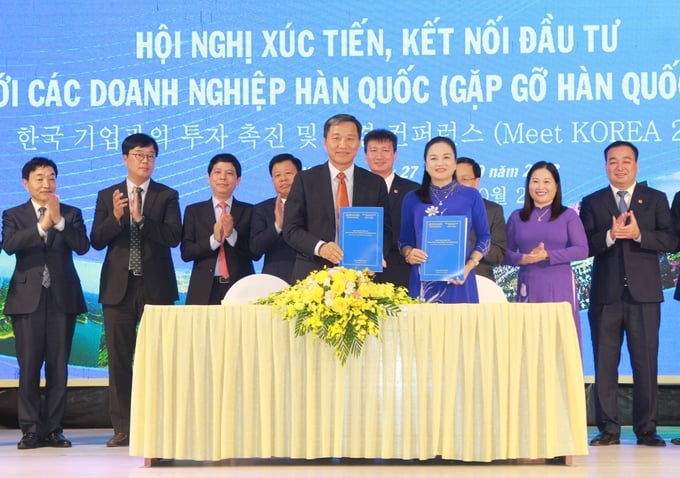
Representatives from the Yen Bai Entrepreneur Association and the South Korean Business Association in Hai Phong also signed an agreement to enhance investment and business connections. Photo: Thanh Tien.
Yen Bai province aims to be among the top five most developed provinces in terms of focused investment attraction policies in the North Central and Northern Mountainous regions of Vietnam by 2030. Accordingly, the target is to achieve an average annual Gross Regional Domestic Product (GRDP) growth rate of 8.5%. The economic structure is envisioned as follows: agriculture, forestry, and fisheries will represent approximately 14.8%; industry and construction 39%; services 41.5%. In addition, the per capita income is projected to surpass 125 million Vietnamese dong.
Translated by Nguyen Hai Long
/2025/06/17/3942-2-143243_548.jpg)
(VAN) Recently, in Sweden, the Secretary of the Binh Dinh Provincial Party Committee presented the Investment Registration Certificate for the 'Polyester Fabric Recycling Complex' project to SYRE Impact-AB Company.
/2025/06/12/3721-2-202745_83.jpg)
(VAN) TH made an impression at Seoul Food 2025 with its line of natural beverages, paving the way for Vietnamese food products to enter the South Korean market.

(VAN) Soc Trang's success in rice exports stems from a strategy of developing fragrant and specialty rice cultivation areas and standardizing production toward low-emission practices.
/2025/06/11/1311-5-120811_839.jpg)
(VAN) The pig farming industry is facing the challenge of comprehensive restructuring to meet requirements for quality, safety, traceability, and market expansion both domestically and for export.

(VAN) Vietnam considers participating in ALGROALBA in order to expand agricultural production, coordinate the assessment and effective exploitation potential land.
/2025/06/05/5314-1-184727_407.jpg)
(VAN) From seemingly worthless fish scales and skin, enzymes and lactic ferments can transform by-products into peptides, opening a sustainable, effective business direction and elevating Vietnamese seafood.

(VAN) TTC AgriS and IFC signed a strategic partnership to develop a sustainable agricultural value chain, aiming to achieve the Net Zero target by 2035.